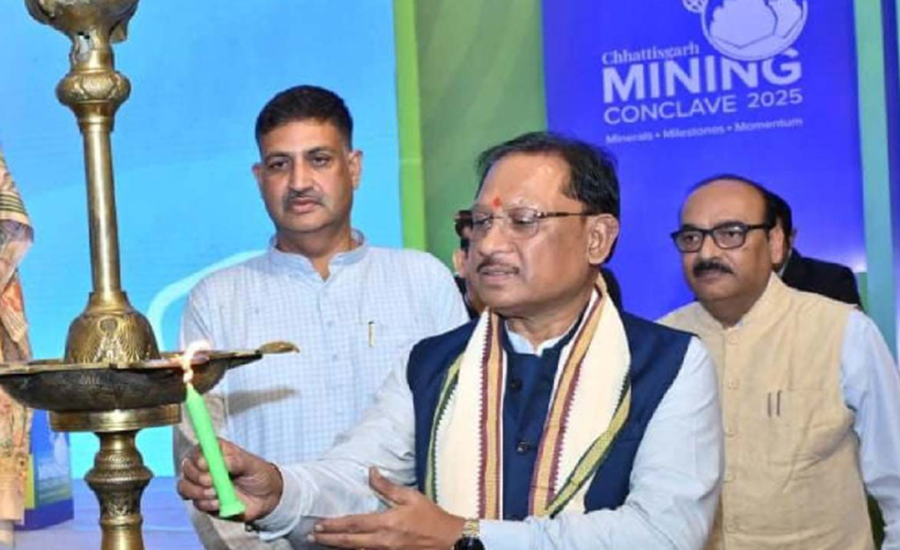Chhattisgarh has taken a major leap towards becoming India’s mineral capital with the launch of multiple digital platforms, transparent auction processes, and industry collaborations during the Chhattisgarh Mining Conclave 2025. The event, held in the presence of Chief Minister Shri Vishnu Deo Sai, witnessed MoUs, policy launches, and the announcement of record revenue of Rs. 14,195 crore for 2024–25.
The state has become the first in India to auction lithium blocks, marking a strategic move in the global push for critical minerals required for clean energy and high-tech manufacturing.
New MoUs Strengthen Strategic Mineral Exploration and Industry Collaboration
Major Memorandums of Understanding (MoUs) were signed at the conclave:
- ISM Dhanbad partnered with the Chhattisgarh Directorate of Geology and Mining.
- Coal India signed an MoU with the Chhattisgarh Mineral Development Corporation for critical minerals exploration.
- Additional MoUs were signed with IIT Roorkee and other institutions to promote clean energy sector investments.
These collaborations aim to enhance scientific mining, build skilled human resources, and attract private investment.
Digital Transformation: Mineral Online 2.0, DMF Portal, and Reverse Auction Portal Launched
In a significant step toward e-governance and transparency, the Chief Minister launched three major digital platforms:
- Mineral Online 2.0 – An upgraded mineral management system focused on transparency and accountability.
- DMF Portal 2.0 – For real-time monitoring of the District Mineral Foundation (DMF) under revised 2025 rules, aligned with Pradhan Mantri Khanij Kshetra Kalyan Yojana (PMKKKY).
- Reverse Auction Portal for Sand Mines – Developed in partnership with MSTC, this portal will speed up sand mine allocation and support PM Awas Yojana beneficiaries.
These reforms are expected to improve governance, increase ease of doing business, and boost revenue through efficient resource allocation.
Record-Breaking Revenue and Development Milestones
Chief Minister Sai stated that Chhattisgarh received DMF contributions worth Rs. 1,673 crore, which enabled the approval of 9,362 development works in affected regions. He emphasized that transparent mining policies and e-auctions have redefined resource management.
With 60 mineral block auctions completed and five new tenders issued, Chhattisgarh’s approach has set a national benchmark.
Recognizing Excellence: Star Awards for Sustainable Mining
In a first-of-its-kind initiative for minor minerals, 43 mines were honored with Star Ratings for excellence in:
- Environmental compliance
- Pollution control
- Workplace safety
Three mines received 5-star ratings, 32 received 4-star, and eight received 3-star ratings. The awards were presented by the Chief Minister to encourage scientific and sustainable mining practices.
New Materials, E-Waste Recycling, and Youth Training
According to Mr. Saurabh Singh, Chairman of Chhattisgarh Mineral Development Corporation, the state has:
- Begun producing new materials from tin sludge
- Initiated critical ore recycling and e-waste management
- Introduced technical training programs for youth to build skilled manpower for the mining and allied sectors
Currently, 28 types of minerals, including tin, bauxite, coal, limestone, and iron ore, are mined in the state.
Leading the Way Towards Viksit Bharat 2047
Chief Secretary Mr. Vikassheel highlighted the government’s focus on:
- Ease of doing business
- Stakeholder-driven policy reform
- Water conservation and renewable energy
- Integration of solar power in mining operations
He praised the new Industrial Policy of the state, which is expected to create significant employment opportunities and contribute to Prime Minister Narendra Modi’s vision of a Developed India by 2047.
Conclusion: Chhattisgarh Sets National Example in Resource-Led Growth
From scientific mining and critical mineral production to tech-enabled governance and sustainable practices, Chhattisgarh is crafting a new model of mineral development — one that is equitable, transparent, and future-ready.
As stated by Mr. P. Dayanand, Secretary of the Mineral Department, and Mr. Rajat Bansal, Director of Geology and Mineral Resources, the roadmap ahead involves scaling innovation, maximizing economic returns, and prioritizing local communities through sustainable practices.





























